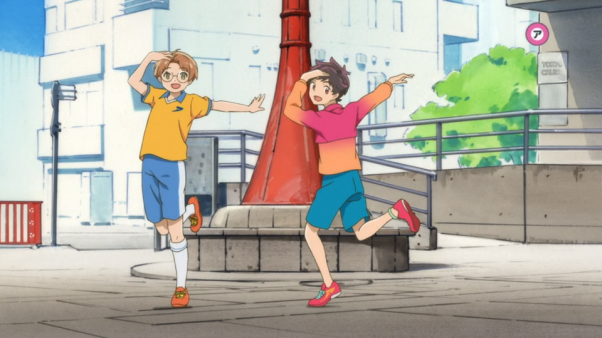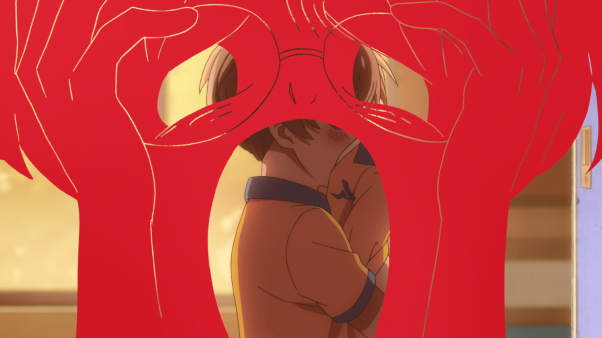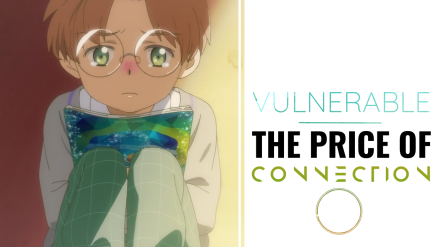Chances are that if you were linked here from another blogger pal, then you might be new. To those first-timers, “Hi, I’m Takuto, welcome to my anime cafe!” For the OWLS blog tour’s sixth monthly topic of 2019, “Vulnerable,” I wanted to give some character spotlight to this spring season’s craziest title: Ikuhara’s Sarazanmai.
In the month of June, we will be discussing what it means to be vulnerable. To some individuals, being vulnerable could be seen as a sign of weakness, but in fact, vulnerability is actually a sign of strength. We will explore what it means to be vulnerable and how certain characters in pop culture glamorize vulnerability. When do we show our vulnerability? How do we express vulnerability? Why should we show vulnerability? These are questions that we will be discussing in our posts featuring characters that show vulnerability and/or sensitivity and what we can learn from them or even our own personal stories.
I was pretty stoked when this month’s theme was announced. “How unusual, yet cool,” I remember thinking. Sarazanmai definitely fits the bill well, and what do you know—it’s even got some queer representation in it, perfect for pride month! Thanks Lyn for the prompt!

A brief discussion of the original, 11-episode spring 2019 anime “Sarazanmai,” animated by MAPPA and Lapin Track, directed by Kunihiko Ikuhara and Nobuyuki Takeuchi, and written by Ikuhara and Teruko Utsumi. SPOILERS for episodes 1-3 will be present.
We’re All Connected
What does it mean to connect? Middle school boy and Asakusa local Kazuki Yasaka is trying to figure that out for himself. After accidentally breaking a statue of a kappa, Kazuki and his friends Enta Jinnai and Toi Kuji find themselves transforming into the very creature of Japanese folklore at the behest of Keppi, prince of the Kappa Kingdom. To become human again, they must fight against the kappa-zombies, even stranger beings birthed from human desires and created by Keppi’s enemies: the Otter Empire.
If that weren’t already enough, to kill the kappa-zombies, the trio must perform the “Sarazanmai,” a sound produced only when the three are united. But making such connections are much easier said than done. What’s even worse is that each time they emit the sound, one of their secrets are revealed to the others! (Vulnerable in every sense of the word, am I right??)
For their efforts, Keppi cuts them a deal: Collect the rampant desires of the kappa-zombies and he’ll bestow upon them the “Dishes of Hope,” plates Keppi can create from humanity’s darkness that can make their wishes come true. When Kazuki, Enta, and Toi find that it takes five plates to make even just one wish come true, however, the friendship of these three boys is challenged. With every new fight springs forth another one of their innermost secrets, whether they like it or not! It’s only a matter of time before one of the boys breaks—but will the connections to their loved ones shatter with the fall?

Sarazanmai is equal parts sarcastic and dramatic in its storytelling. During half of it, you are allowed to laugh at the silliness of it all. Probably for more than half, actually. To obtain the desires of the kappa-zombies, Kazuki and friends must enter the, ehem, *anus* of the demons and steal their shirikodama, a mythical orb said to contain the desires of one’s soul. Sound kinda dumb? Well, don’t blame the writers (or do for going through with it), because that’s actually how the legend of the Kappa goes, believe it or not!
And that’s just the beginning of the absurdity. Wait till we introduce the fortune-telling idol girl, the boy who cross-dresses as said idol, the other boy who shot a yakuza when he was just a wee tot, and the gay cops!! Oh Ikuhara, you’ve really created art with this one!
Joking aside, Sarazanmai is a neat little coming-of-age fantasy story for three poor youths who can’t seem to understand their place in the world. They don’t feel connected to anyone, lost adrift the tumultuous sea of love, and that’s what makes the moments when they realize the true meaning of their bonds so tender. Unconventional in execution, perhaps, but still immensely entertaining to follow.

So, What is the Sarazanmai?
Is it a song? A dance? Something you can eat? Keppi says that: “Sarazanmai” refers to a connection of mind and soul. You share all your deepest secrets as well.”
So it’s abstract, but still simple to grasp. Humans are connected through their shirikodamas. When they lose them—as when Kappa Kazuki steals it to perform the Sarazanmai with Enta and Toi—they become incapable of connecting with anyone else, and they get kicked out of the circle that makes up the world (also quoted by Keppi). Yeesh, talk about a soul-siphoning ceremony!
By uniting in the Sarazanmai, Keppi can obtain these captured desires. Much like a double-edged sword, however, some of the users’ own desires inadvertently “leak” in the process. We’re talking about these boys’ private diary-grade secrets, which is what I want to talk about next. Trust them on this one: it ain’t easy being green.

I Want to Connect, But . . .
Reaching out to others is hard. It can be especially scary if you already think little of yourself. For whatever reason, trust me, we’ve all been there, and so have Kazuki, Enta, and Toi. Because Kazuki’s backstory carries more significance with the latter half, Toi’s with the show’s ending, I’ll be focusing on the Enta, our glasses wearing member of the “Golden Duo” meant to last all time!
Kazuki and Enta have been best friends ever since they met. After watching the other boys kick the soccer ball during practice for several weeks, a young Kazuki finally extends a hand to Enta to join the team. He was invited inside the circle, and granted permission to interact with an all-star like Kazuki. It sounds like a cold way of viewing their initial exchange, but this is how Enta, with all his self-doubts and insecurities, felt towards soccer and this new life.

But feelings of more than just friendship blossomed for Enta. A closeted gay kid, Enta fell in love with his straight best friend. He felt blessed for having such a friend in his life, but cursed for feeling things that otherwise conflict with both the object of his affection and the status quo.
So like any shy gay boy, Enta hid these unacceptable feelings. He hid it all, months, years—
Until he performed the Sarazanmai.

Despite how hard he sheltered his secrets, all finally came bursting at the seams. Enta was left 100% unguarded, vulnerable. The boys saw how Enta inhaled Kazuki’s scent on his jersey in the locker room—how Enta’s expression glowed with lust when he placed his lips on Kazuki’s recorder—how Enta even KISSED Kazuki’s lips while he lie asleep. It was too much, way too embarrassing!! Kazuki was shocked, but blew it off under the assumption that his teammates dared Enta to kiss him. For Enta, however, his feelings were rejected, and not just trivialized, but entirely unacknowledged.
To be looked away by his love crushed him. Enta wanted to connect, but it wasn’t meant to be. Enta wanted to connect, to lie about what he did, but the Sarazanmai only reveals the truth. Enta wanted to connect, but to take more than what he could have. He wanted to connect, but Kazuki was so far away. And at the very end, when Enta stole the dishes for the chance to satisfy his own selfish wish, he couldn’t be forgiven. Lover became stranger, and Enta lost sight of himself.

Love Yourself, & Cherish the Bonds You Form
I think if Sarazanmai has a bigger message under its themes of connection and expression, it’s this. When his whole life came crashing down on him, Enta first had to learn to be happy with himself if he was to not give up on his wish. Sure, he betrayed his friends, but he never gave up on Kazuki, even if Kazuki hated him for his actions.
We have to learn to be happy with ourselves if we are to form genuine connections with others. That said, we can still dislike parts of ourselves. I don’t think Enta ever wanted to have the feelings that he did for Kazuki, nor did he like feeling like a bystander all the time. But he eventually embraced those parts of himself, and found that all of these aspects—the good and the bad, the black and the white, the lustful and the loving—made up who he was as a person.

Underneath its wacky, circus-like presentation, Sarazanmai is story about victimization, victimizing, and inadvertently hurting the people you love most to protect yourself. It shows us the price of maintaining connections with others, the deadly costs and the sinful pleasures alike. Each of the boys got to the point where they couldn’t even tell their closest friends about what was going on in their life, and that’s deeply eye-opening. Some connections cause you pain, yet you have to hold on to them.
Full of hidden meanings and rife with cultural symbolism, Sarazanmai delves into messy territory with philosophy on what it means to form genuine connections with others. How much should I give in a relationship? What should I be receiving in return? Is a connection supposed to be completely reciprocal, or . . . is it ok for one party to wind up with more?
What does it mean to love someone, as opposed to desire something? How can my dreams help others, or why do my desires always hurt someone else? Merely living might be the hardest part, but true human connection and love make it all worthwhile. So long as we try to reach out to others and form connections, we’ll always be vulnerable to attack, physical or emotional.
But more importantly, just by trying, we’ll always have the chance to be happy—and not even a desire-snatching kappa can steal that opportunity away from you.

Never forget that only those who connect their desires through the pain of loss can take the future in their hands. — Azuma Sara
Afterword
There’s A LOT going on in Sarazanmai, and a lot of good, might I add. This was easily one of the most fun watches I’ve had in a long time, and I hope the series stays on the radar for longer than this spring season. I would’ve loved more time with the characters, but I don’t feel like anything essential was left out. Maybe I’ll revisit it in a future post, but until then, Sarazanmai is honored here at the cafe as a “Cake” title, a show too sweet to miss out on. (Although if you’re not careful, this one might give you a cavity!)
So many people dropped this series, and that saddens me immensely considering that the ending is so rewarding. What did you think of Sarazanmai? Was it too weird for you, or right up your alley? Who was your best boy? I’d love to know in the comments! My love goes out to these precious kappa kids!

This concludes my June 29th entry in the OWLS “Vulnerable” blog tour. Carla over at Pop Culture Literary gave us a very interesting post about Jen Wang’s comic The Prince and the Dressmaker that you can read right here! Now, look out for Fred (Au Natural) as he rounds out this exciting pride-filled month with his own take on vulnerability on Sunday, June 30th! Thank you so much for reading, and until next time, this has been
– Takuto, your host

